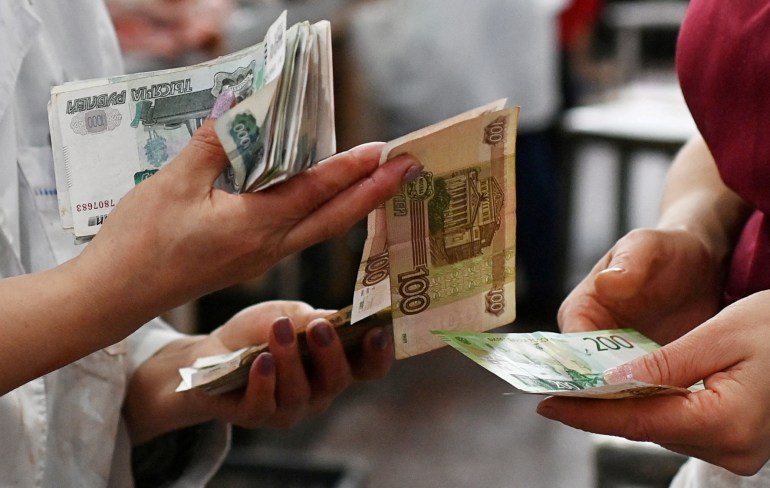Latest Ukraine updates: Russia, US exchange harsh words at UN
Ukraine news from January 31: Russia accuses the West of ‘whipping up tensions’ over Ukraine as the US warns Moscow is attempting to ‘fabricate a pretext for an attack’.

Moscow has accused the West of “whipping up tensions” over Ukraine in a heated exchange at the UN Security Council, as the US warned that Russia’s growing military force of more than 100,000 troops along Ukraine’s borders was “the largest mobilisation” in Europe in decades.
The UNSC met on Monday to discuss Russia’s troop buildup, the first in a series of high-stakes meetings and talks planned this week aimed at defusing the Ukraine crisis.
Keep reading
list of 4 itemsPutin no longer fears a ‘democratic Ukraine’
Europe’s energy security worries NATO amid standoff with Russia
War-weary residents lament homes lost in eastern Ukraine shelling
Moscow announced Russian Foreign Minister Sergey Lavrov will hold talks by phone with US Secretary of State Antony Blinken on Tuesday. Separately, British Prime Minister Boris Johnson said he would warn Russian President Vladimir Putin to “step back from the brink” in a planned phone call,
Russia denies having any plan to invade and Ukraine’s president has talked down the prospect of an imminent incursion, rejecting unnecessary “panic”.
This live blog is now closed. Thanks for joining us. Here are the updates for January 31.
Poland offers Ukraine ammunition ahead of PM’s visit
Poland has said it offered Ukraine tens of thousands of ammunition rounds before Prime Minister Mateusz Morawiecki’s visit to Kyiv.
The EU member has also announced it is readying itself for a potential wave of up to a million refugees from Ukraine if negotiations fail and war breaks out.
“The decision has been taken to send defensive ammunition to Ukraine,” said Pawel Soloch, head of the national security bureau.
Must be ‘open and candid’ about Russia threats
The Biden administration says it’s important “to be open and candid” about the threat Russia poses to Ukraine and notes the intention is to inform the American public and the global community “of the seriousness of the threat.”
Press secretary Jen Psaki made the comments at a news briefing shortly after Russia accused the West of “whipping up tensions” over Ukraine.
Psaki also confirmed the Biden administration has developed “specific sanctions packages for both Russian elites and their family members if Russia further invades Ukraine”.
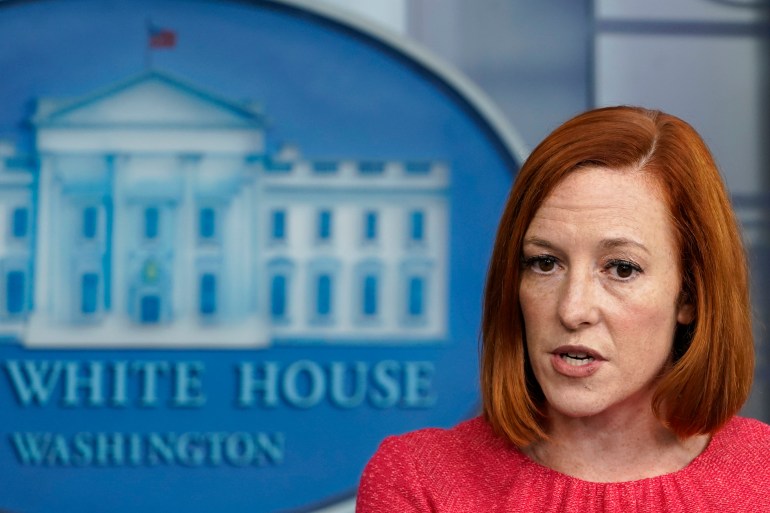
Ukrainian families ‘torn apart’ over crisis with Russia: AJ correspondent
Al Jazeera’s Hoda Abdel-Hamid reporting from Kyiv said many people are “torn apart” amid tensions between Russia and Ukraine
“Some of them were actually supporting the government in Kyiv, and some of them did support Russia or didn’t see Russia in a bad way,” she added.
“So it is causing a lot of problems at many different levels. And I think the message definitely that you hear from leaders is stop panicking. The war is not there yet. We’ve been living under this threat for the past eight years. We’ve seen this happen before. This is not yet the time to be concerned.”
Putin, Macron discuss Ukraine: Kremlin
Russian President Vladimir Putin and his French counterpart Emmanuel Macron have spoken on the phone regarding Ukraine tensions, the Kremlin said.
“The leaders expressed their views on the situation regarding Ukraine as well as issues related to providing Russia with long-term and legally-binding security guarantees,” the Kremlin said in a statement, adding Putin and Macron discussed the possibility of a face-to-face meeting.
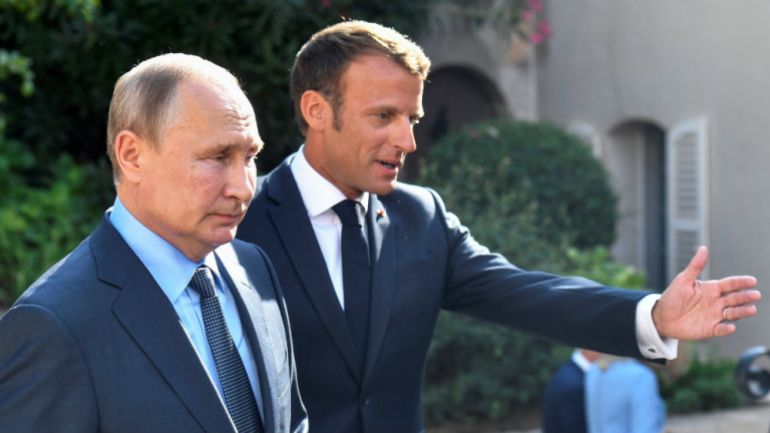
Russia, US exchange harsh words over Ukraine at UN
At the UN Security Council session, Russia accused the West of “whipping up tensions” over Ukraine and said the US had brought “pure Nazis” to power in Kyiv.
US Ambassador Linda Thomas-Greenfield shot back that Russia’s growing military force of more than 100,000 troops along Ukraine’s borders was “the largest mobilisation” in Europe in decades, adding there has been a spike in cyberattacks and Russian disinformation.
“And they are attempting, without any factual basis, to paint Ukraine and Western countries as the aggressors to fabricate a pretext for attack,” she said.
Ukraine ready to defend its itself: UN ambassador
Ukrainian ambassador to the United Nations has asked Russia how long it plans to “pressure” Ukraine and its partners into a “Kafka trap”, while reiterating that it was “ready to defend itself”.
“At the same time, we support the need to keep diplomatic channels with Russia open. If that prevents a shift to military tools. My president has reiterated most recently that he’s ready to meet his Russian counterpart,” Sergiy Kyslytsya said at the UN Security Council meeting.

Ukraine crisis has ‘little resonance’ outside of Europe, North America : Academic
The Russia-Ukraine crisis has “little resonance” in the world outside of Europe and North America, Mark Galeotti, a lecturer at the University of London, told Al Jazeera.
“I think it’s really quite an interesting example of what is a very, very dramatic crisis in terms of European security, that actually has strikingly little resonance outside of Europe, broadly conceptualised, and North America,” he said via Skype from London
“So I think that … everyone, frankly, would rather this got settled in some kind of diplomatic, if not particularly amicable way. And certainly, if the Russians do actually launch some unprovoked, wider military intervention, they can expect to be criticised for it.”
However, he said the US should not assume what is important to it, is important to everyone else across the world.
Qatar emir meets Biden in shadow of Ukraine tensions
US President Joe Biden will build on attempts to ensure energy back-up for European allies when he hosts Qatar’s emir in a White House meeting overshadowed by fears Russia could cut exports over the Ukraine crisis.
Announcing the visit, press secretary Jen Psaki said Sheikh Tamim bin Hamad Al Thani and Biden would be discussing “the stability of global energy supplies”.
Denmark ready to send military equipment to Ukraine
Denmark says it is prepared to send military equipment to Ukraine, as the West intensifies diplomacy and threatens harsh economic sanctions on Russia.
“I am ready to send military equipment to Ukraine. We are already giving advice,” Prime Minister Mette Frederiksen told a press conference.
“We know there is a request for advice over cybersecurity,” she added, after a major cyberattack, attributed to Russia by Kyiv, hacked Ukrainian government websites earlier this month.
Boeing says US-Russia relations weighing on business
The ongoing status of US-Russia relations is creating an adverse climate for Boeing Co’s business, the US planemaker said in a securities filing.
“We continue to monitor and evaluate additional sanctions and export restrictions that may be imposed by the U.S. Government and any responses from Russia that could directly affect our supply chain, business partners or customers,” Boeing added.
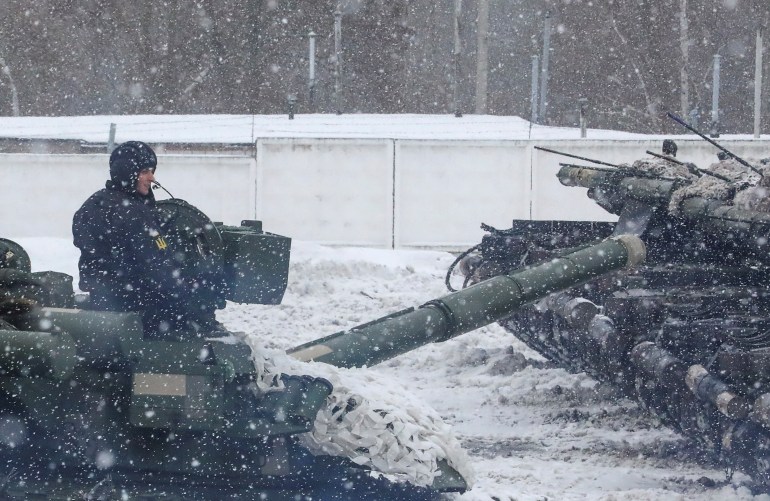
Biden says Russia to face consequences if it attacks Ukraine
President Joe Biden has warned Russia it would face “swift and severe consequences” from the US and its partners if Moscow attacked Ukraine, while keeping the path of diplomacy open by suggesting the possibility of dialogue.
“If Russia is sincere about addressing our respective security concerns through dialogue, the United States and our Allies and partners will continue to engage in good faith”, Biden said in a statement put out by the White House.
“If instead Russia chooses to walk away from diplomacy and attack Ukraine, Russia will bear the responsibility, and it will face swift and severe consequences”.
“The United States and our Allies and partners continue to prepare for every scenario.”
UNSC votes to hold public meeting on Ukraine crisis
The UNSC votes in favour of holding a public meeting on the Ukraine crisis.
Ten council members backed holding the session, which Russia and China opposed. Three council members abstained from voting.
The vote came after Russia’s ambassador to the UN criticised what he called “megaphone diplomacy” as he appealed for the council to reject the Washington-proposed meeting. Vasily Nebenzya, speaking to the council, denounced what he said was interference in the domestic affairs of Russia.
China’s UN envoy says Beijing opposes public Security Council meeting
China’s ambassador to the UN has said his government favours quiet diplomacy to resolve the Ukraine crisis and will oppose a public session of the UNSC on the issue.
“We are against a public meeting,” Chinese envoy Zhang Jun told reporters as he entered the council chamber. “This is really the right time calling for quiet diplomacy.”
How are Russian media outlets portraying the Ukraine crisis?
In Western and Ukrainian media, Russia’s massing of troops near its border with Ukraine has been portrayed as imperialist aggression and Moscow trying to bully its smaller neighbour. In Russia, however, coverage has been rather different.
Read more on how domestic media has reported on the crisis here.
The UN Security Council and its role in the Ukraine crisis
- The US has described the UNSC meeting, which Washington requested, as a chance for Russia to explain itself.
- But Moscow signalled it could try and block the meeting of the 15-member body. Nine votes are needed for it to proceed.
- Aside from members having the opportunity to air their views openly, there will be no action by the Council – even if Russia were to invade Ukraine. A simple statement needs consensus support and Russia is able to veto any bid for a resolution.
- That is because Russia is one of five permanent, veto-wielding powers on the council along with China, France, the UK and the US.
- On Tuesday, Russia takes over the UNSC’s rotating presidency for February. The largely administrative role does involve scheduling meetings, so some diplomats warn Moscow could delay future attempts by council members to request discussions on the crisis.

‘Russia may try and force a procedural vote’ at UNSC meeting
Al Jazeera’s Diplomatic Editor James Bays, reporting from the UN’s headquarters in New York, says Russia “may try and stop” the UNSC meeting as it starts.
“We are hearing that Russia may try and force a procedural vote, and say to the other members of this council ‘this isn’t an issue of international peace and security as nothing has happened here,'” Bays said.
“And if they do, all of the council members will get to have a vote whether to have the meeting or not … so I think we are going to see some high drama potentially before the meeting even takes place.”
Infographic: NATO expansion
NATO, the current bugbear of Putin and a beacon of security for many countries fearful of Moscow, has expanded its membership multiple times since it was first formed in the wake of World War II.
The Washington-headed alliance has steadily added a swath of Central and Eastern European states into its ranks, troubling Moscow, which is wary of the 30-member strong body edging ever closer to its borders and hemming it in from the West.
Here’s how it has evolved.
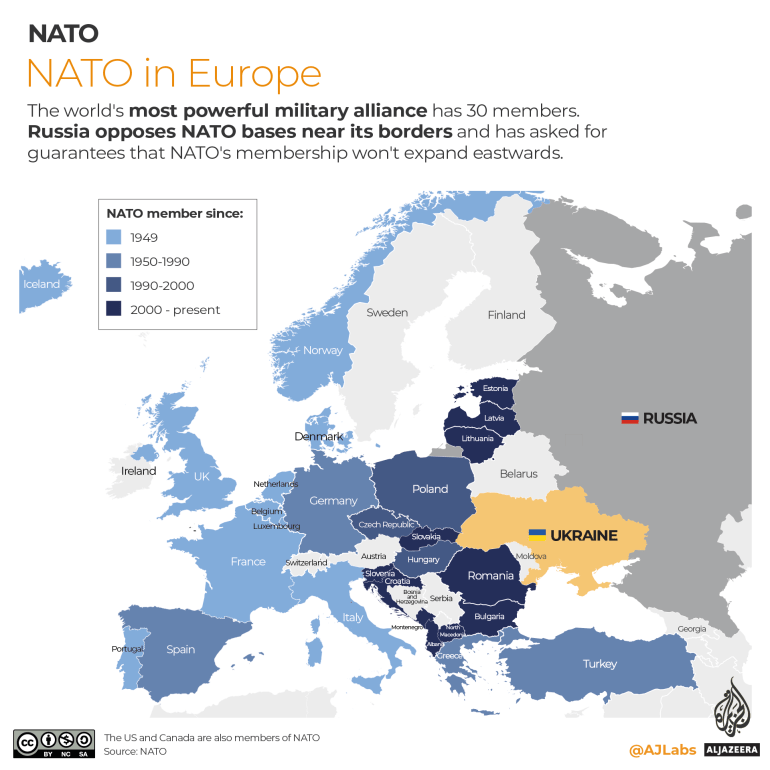
Kyiv welcomes UK sanctions warning
Ukraine’s Foreign Minister Dmytro Kuleba has welcomed the United Kingdom’s warning of sanctions against Russia if it invades Ukraine.
“We urge partners to take such actions as they are an important factor in deterring the Russian elite from rash decisions,” Kuleba told a televised briefing.
“When Russian dignitaries realise that they are talking about their assets, real estate and money abroad, where they – the patriots of Russia – keep them, the hotheads in the Kremlin will cool down,” he said.
Ukraine crisis: Why is Germany out of step with the US, Europe?
Germany has refused to send weapons to Ukraine, despite fellow NATO allies doing so, and its navy chief stepped down last week after he downplayed the crisis.
The developments have frustrated Berlin’s Western allies, who want to present a united front to the Kremlin.
Read more here.
‘Hysteria promoted by Washington leads to hysteria in Ukraine’: Kremlin
Kremlin spokesman Dmitry Peskov has accused the US of provoking “hysteria” in Ukraine.
“Hysteria promoted by Washington leads in fact to hysteria in Ukraine”, Peskov said when asked about reports that Washington is unhappy with Ukrainian President Volodymyr Zelenskyy downplaying the prospect of an imminent Russian invasion.
“We consistently criticise this line and call on Washington and allies of Washington on the European continent to abandon such a policy,” he told reporters during his daily news briefing.
The Ukraine-Russia crisis explained in infographics
Al Jazeera has put together eight infographics explaining the history, politics and economics of the Ukraine-Russia crisis.
Have a look here.
‘We will face Russian military buildup in Belarus in the future’: Polish FM
Polish Foreign Minister Zbigniew Rau says Warsaw sees signs that Russia will increase its future military presence in Belarus.
“We are aware of planned exercises of Belarusian and Russian troops in February … We are even observing some tendencies that can indicate that we will face Russian military buildup in Belarus in the future,” Rau said during a visit to the Estonian capital, Tallinn.
Lavrov and Blinken to speak on Tuesday: Report
Sergey Lavrov will speak to Antony Blinken on Tuesday, Russia’s TASS news agency reports, citing a foreign ministry spokeswoman.
“Lavrov and Blinken will have a telephone conversation on Tuesday,” Maria Zakharova was quoted as telling reporters at a news briefing. “A face-to-face meeting is not planned.”
In Pictures: Nervous calm in Ukrainian front-line village as war looms
In eastern Ukraine, where Kyiv has been fighting Russian-backed separatists since 2014, the village of Zolote is waiting nervously to see which turn the crisis will take next.
Take a look here.
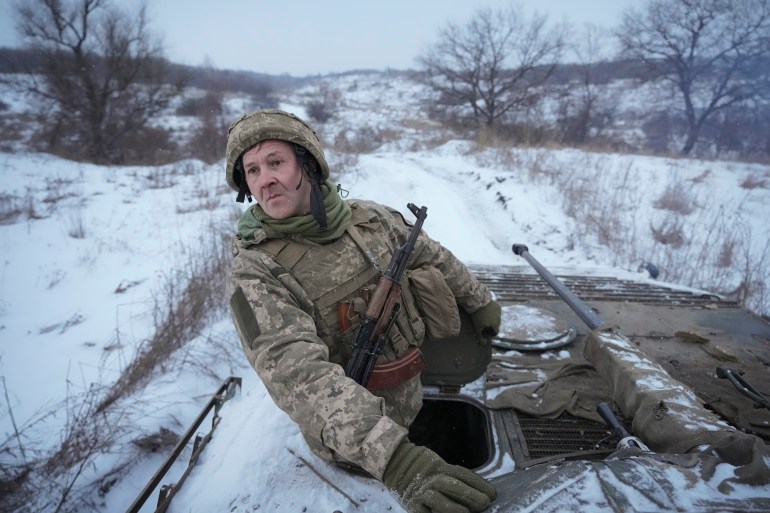
Ukrainian soldier wounded
Russian-backed forces have wounded a Ukrainian soldier near Luhansk, the military said, citing a ceasefire violation.
Ukraine’s Joint Forces Operation said the soldier was taken to hospital following Sunday’s incident. He is reportedly in stable condition.
Kremlin says no date set for response to US, NATO
Putin will respond to counter-proposals from the US and NATO “when he considers it necessary”, with no date set, the Kremlin has said.
Washington and Brussels replied last week to Moscow’s demands for legally binding security guarantees, issued in December. Putin said on Friday that the responses had not addressed Moscow’s main security demands but that Russia was ready to keep talking.
Johnson to tell Putin to “step back from the brink”
Johnson says he will ask Putin for calm over Ukraine when the two leaders speak.
“What I will say to President Putin, as I’ve said before, is that I think we really all need to step back from the brink, and I think Russia needs to step back from the brink,” Johnson told reporters.
Kremlin slams UK sanctions threats
The Kremlin says the UK’s threats to introduce sanctions against Russian companies and businessmen linked to Putin are alarming and warned such actions will backfire by hurting British companies.
Spokesman Peskov said the suggested action was an attack on Russian businesses, undermined the UK’s investment climate and inflamed tensions in Europe.
“An attack by a given country on Russian business implies retaliatory measures, and these measures will be formulated based on our interests if necessary,” the Kremlin spokesman told reporters during his daily news briefing.
Ukrainian police detain suspected riot plotters
Ukrainian police have detained a group of people suspected of planning mass riots in Kyiv and other cities, according to the country’s interior minister, who did not say how many people had been detained or who they were.
Denys Monastyrskiy told a televised briefing the arrests were made on Sunday and that about 5,000 people were supposed to take part in riots and clashes with police in five cities in northern and central Ukraine.
“This action, which was planned in advance, was originally aimed at violent actions and organising riots and had nothing to do with peaceful protests,” Monastyrskiy said. “It was … intended precisely to shake up and destabilise the situation in Ukraine.”
Russian navy concludes anti-submarine drills
Vessels of Russia’s Northern Fleet have completed anti-submarine drills in the Norwegian Sea, the Russian defence ministry has said.
The ministry said in a statement that a Russian missile cruiser and a frigate aided by a specially equipped helicopter practised various ways of locating submarines during the manoeuvres.
The drills were part of a broader naval exercise involving more than 140 vessels from all of Russia’s fleets in the Atlantic and Pacific oceans and the North, Okhotsk and Mediterranean seas.
UK threatens sanctions on those ‘with closest links to the Kremlin’
The UK will sanction businesses and people with the closest links to Putin if Moscow takes any action against Ukraine, Chief Secretary to the Treasury Simon Clarke has said.
“We are very clear that if Russia takes further action against Ukraine, then we will further tighten the sanctions regime targeting those businesses and people with the closest links to the Kremlin,” Clarke told UK broadcaster Sky News.
Since the 1991 fall of the Soviet Union, London has become the pre-eminent global centre for a vast outflow of money from former Soviet republics.
Rouble heads towards one-week high vs dollar
The rouble has strengthened and is approaching a one-week high versus the dollar after Moscow’s indication last week that it is ready to continue dialogue with the West over Ukraine.
At 07:30 GMT, the rouble was 0.4 percent stronger against the dollar at 77.46. It had sunk to a near 15-month low last week of 80.4125.
The currency had gained 0.2 percent to trade at 86.45 versus the euro.
